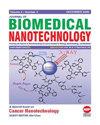MicroRNA-223 Suppresses the Progression of Esophageal Cancer by Negatively Regulating SMAD Family Member 4
IF 2.9
4区 医学
Q1 Medicine
引用次数: 0
Abstract
The purpose of this study was to elucidate the biological role of MicroRNA-223 (miRNA-223) in mediating the malignant progression of esophageal cancer and the underlying mechanism. MiRNA-223 levels were measured using qRT-PCR in 50 paired esophageal cancer tissues and adjacent paracancerous tissues. The correlation between miRNA-223 level and pathological indicators in esophageal cancer patients was analyzed. In vitro experiments assessed the impact of miRNA-223 on the proliferative, migratory, and invasive abilities of esophageal cancer cells. Additionally, rescue experiments were conducted to investigate the involvement of miRNA-223 and its downstream target, SMAD4, in the progression of esophageal cancer. Esophageal cancer tissues showed decreased levels of miRNA-223 compared to adjacent tissues. Patients with low miRNA-223 exhibited higher rates of lymphatic and distant metastasis, as well as poorer overall survival than those with high miRNA-223 levels. Increasing miRNA-223 in TE-1 and EC-109 cells reduced their proliferative, migratory, and invasive capabilities. Esophageal cancer tissues and cell lines displayed elevated SMAD4 levels, which were negatively regulated by miRNA-223. Restoring SMAD4 expression partially reversed the inhibitory effects of miRNA-223 overexpression in esophageal cancer cells. MiRNA-223 is closely correlated to lymphatic metastasis, distant metastasis and poor prognosis of esophageal cancer patients. MiRNA-223 suppresses proliferative, migratory and invasive abilities of esophageal cancer cells via negatively regulating SMAD4.MicroRNA-223 通过负调控 SMAD 家族成员 4 抑制食管癌的进展
本研究旨在阐明MicroRNA-223(miRNA-223)在介导食管癌恶性进展中的生物学作用及其内在机制。研究采用 qRT-PCR 技术测定了 50 例配对食管癌组织和邻近癌旁组织的 miRNA-223 水平。分析了 miRNA-223 水平与食管癌患者病理指标的相关性。体外实验评估了 miRNA-223 对食管癌细胞增殖、迁移和侵袭能力的影响。此外,还进行了拯救实验,研究 miRNA-223 及其下游靶标 SMAD4 参与食管癌进展的情况。与邻近组织相比,食管癌组织中的 miRNA-223 水平有所下降。与miRNA-223水平高的患者相比,miRNA-223水平低的患者淋巴转移和远处转移率更高,总生存率也更低。增加 TE-1 和 EC-109 细胞中的 miRNA-223 可降低其增殖、迁移和侵袭能力。食管癌组织和细胞系的 SMAD4 水平升高,而这一水平受 miRNA-223 的负调控。恢复 SMAD4 的表达可部分逆转 miRNA-223 过表达对食管癌细胞的抑制作用。MiRNA-223与食管癌患者的淋巴转移、远处转移和预后不良密切相关。 MiRNA-223通过负调控SMAD4抑制食管癌细胞的增殖、迁移和侵袭能力。
本文章由计算机程序翻译,如有差异,请以英文原文为准。
求助全文
约1分钟内获得全文
求助全文
来源期刊
CiteScore
4.30
自引率
17.20%
发文量
145
审稿时长
2.3 months
期刊介绍:
Information not localized

 求助内容:
求助内容: 应助结果提醒方式:
应助结果提醒方式:


